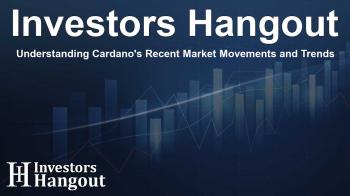Understanding Cardano's Recent Market Movements and Trends

Cardano Experiences Significant Price Drop
Recently, Cardano experienced a notable decline in value, trading around $0.8864. This represents a substantial drop of about 10.20% within a single day. Such a decline marks one of the steepest reductions Cardano has faced since late 2024, specifically on December 9.
Market Capitalization Shifts
This drop has impacted Cardano's market capitalization, decreasing it to approximately $31.4651 billion. This figure currently represents 0.93% of the entire cryptocurrency market. At its peak, Cardano's market cap was recorded at approximately $94.8001 billion, showcasing how much ground has been lost.
Trading Patterns Over Recent Days
In the past 24 hours, Cardano has fluctuated between $0.8863 and $0.9576. The seven-day trend reflects continuing challenges, with a total drop in value of around 15.58%. Within the same period, the trading volume reached about $840.8012 million, accounting for 0.68% of the overall trading activity across the cryptocurrency market.
Historical Price Context
Currently, Cardano's price represents a significant distance from its all-time high of $3.10, which was achieved on September 2, 2021. This current position indicates a decline of approximately 71.40%, highlighting the hurdles that the cryptocurrency has faced since reaching its peak.
Broader Cryptocurrency Market Analysis
Beyond Cardano, other cryptocurrencies are facing challenges as well. For instance, Bitcoin has seen recent trades at around $98,484.7 with a decrease of 6.19% for the day. Similarly, Ethereum has recorded a trading price of $3,069.23, resulting in a loss of 8.17%.
Comparative Market Capitalization
The current market cap for Bitcoin stands at about $1,960.2964 billion, representing 58.08% of the entire cryptocurrency market. In addition, Ethereum's market capitalization is around $371.6230 billion, making up 11.01% of the total cryptocurrency market value.
Conclusion on Current Trends
In summary, the recent trends for Cardano and other cryptocurrencies indicate a challenging market landscape, with Cardano reflecting significant declines not seen in quite some time. The fluctuations in its value and market cap could influence investor sentiment and future trading strategies.
Frequently Asked Questions
What caused the drop in Cardano's price?
The price drop was influenced by market fluctuations common in the cryptocurrency sector and broader economic factors impacting trader confidence.
How does Cardano compare to Bitcoin and Ethereum?
Cardano has experienced more significant percentage losses compared to Bitcoin and Ethereum during the same period, highlighting its volatility.
What is Cardano's historical trading range?
Recently, Cardano has traded between $0.8863 and $0.9576, while its historical high was $3.10 back in 2021.
Is Cardano a good investment now?
Investing decisions should be based on thorough research and individual risk tolerance, considering the current market trends.
What is the future outlook for Cardano?
While recent trends indicate challenges, future prospects for Cardano will depend on overall market conditions and technological advancements.
About The Author
Contact Riley Hayes here.
About Investors Hangout
Investors Hangout is a leading online stock forum for financial discussion and learning, offering a wide range of free tools and resources. It draws in traders of all levels, who exchange market knowledge, investigate trading tactics, and keep an eye on industry developments in real time. Featuring financial articles, stock message boards, quotes, charts, company profiles, and live news updates. Through cooperative learning and a wealth of informational resources, it helps users from novices creating their first portfolios to experts honing their techniques. Join Investors Hangout today: https://investorshangout.com/
The content of this article is based on factual, publicly available information and does not represent legal, financial, or investment advice. Investors Hangout does not offer financial advice, and the author is not a licensed financial advisor. Consult a qualified advisor before making any financial or investment decisions based on this article. This article should not be considered advice to purchase, sell, or hold any securities or other investments. If any of the material provided here is inaccurate, please contact us for corrections.

